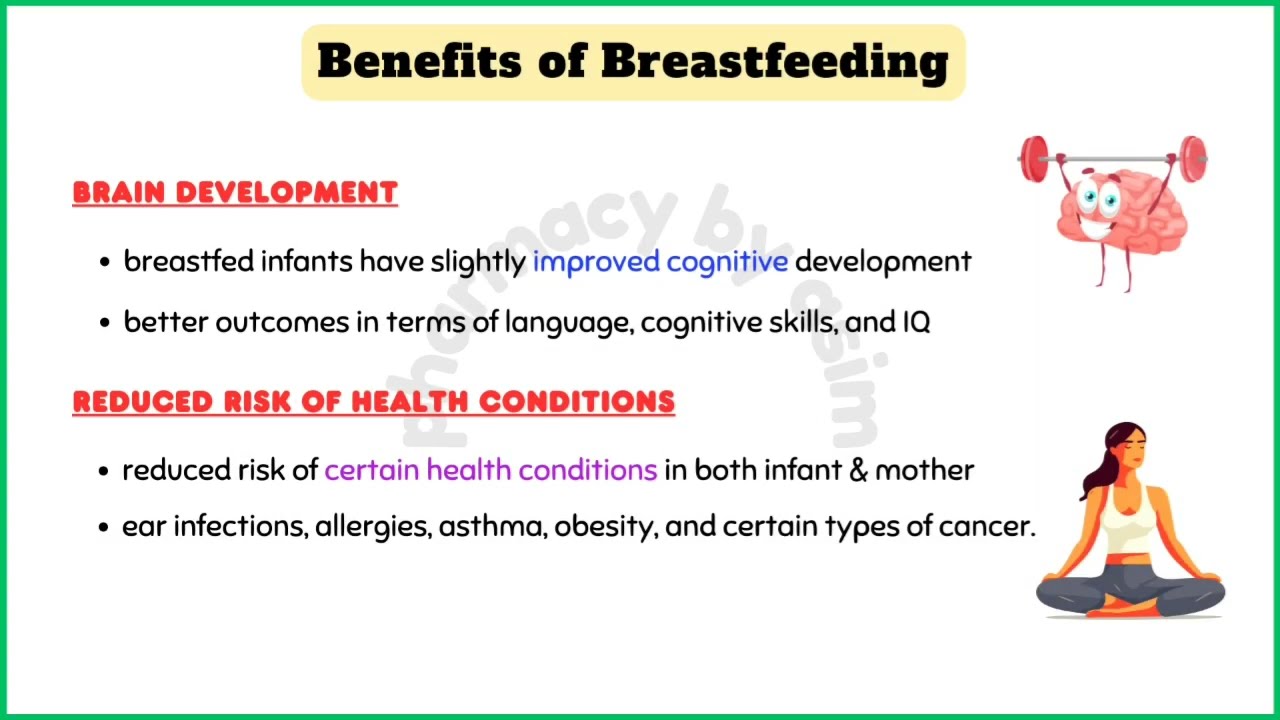Long-Term Benefits of Breastfeeding
The Importance of Breastfeeding
Breastfeeding is a natural and essential process that provides numerous benefits to both the mother and the baby. In this article, we will explore the long-term benefits of breastfeeding and why it is considered the best choice for infant nutrition.
Enhanced Immune System
Breast milk is a rich source of antibodies, which help strengthen the baby’s immune system. The antibodies present in breast milk protect against various infections, allergies, and diseases. Studies have shown that breastfed babies have a lower risk of developing respiratory infections, ear infections, and gastrointestinal diseases.
Cognitive Development
Research has indicated that breastfeeding plays a crucial role in the cognitive development of infants. The nutrients and fatty acids present in breast milk promote brain development and enhance cognitive abilities. Breastfed babies have been found to have higher IQ scores and improved academic performance in later years.
Reduced Risk of Chronic Diseases
Long-term studies have demonstrated that breastfeeding can significantly reduce the risk of chronic diseases in both infants and mothers. Breastfed babies have a lower likelihood of developing conditions such as obesity, diabetes, asthma, and certain types of cancer. Mothers who breastfeed also experience a reduced risk of breast and ovarian cancer, as well as osteoporosis.
Promotes Bonding and Emotional Well-being
Breastfeeding creates a unique bond between the mother and the baby. The skin-to-skin contact and the release of hormones during breastfeeding promote feelings of love, comfort, and security. This bonding experience contributes to the emotional well-being of both the mother and the baby, fostering a strong and nurturing relationship.
Environmental Sustainability
Choosing to breastfeed has a positive impact on the environment. Breast milk is a renewable resource that requires no packaging, transportation, or waste disposal. By breastfeeding, mothers contribute to reducing the carbon footprint and conserving natural resources, making it an eco-friendly choice.

Breastfeeding offers a multitude of long-term benefits for both the baby and the mother. From enhanced immune system and cognitive development to reduced risk of chronic diseases and promoting bonding, breastfeeding is an invaluable choice for infant nutrition. By understanding the long-term benefits of breastfeeding, we can make informed decisions that prioritize the health and well-being of our children.
Frequently Asked Questions about the Long-Term Benefits of Breastfeeding
1. Does breastfeeding have long-term benefits for the baby?
Yes, breastfeeding has numerous long-term benefits for the baby. It helps in building a stronger immune system, reducing the risk of allergies, and promoting healthy brain development.
2. Are there any long-term benefits of breastfeeding for the mother?
Absolutely! Breastfeeding can reduce the risk of breast and ovarian cancer, promote faster postpartum weight loss, and lower the risk of developing type 2 diabetes later in life.
3. How long should I breastfeed to maximize the long-term benefits?
Exclusive breastfeeding for the first six months and continuing it alongside complementary foods for at least one year is recommended to maximize the long-term benefits for both the baby and the mother.
4. Does breastfeeding have any psychological benefits for the baby?
Yes, breastfeeding promotes a strong emotional bond between the mother and the baby, which can have positive psychological effects on the baby’s development and well-being in the long term.
5. Can breastfeeding reduce the risk of childhood obesity?
Yes, breastfeeding has been linked to a reduced risk of childhood obesity. Breast milk contains the right balance of nutrients and helps regulate the baby’s appetite, which can contribute to maintaining a healthy weight in the long run.
6. Are there any long-term benefits of breastfeeding for premature babies?
Absolutely! Breast milk is especially beneficial for premature babies as it provides essential nutrients, antibodies, and growth factors that support their development and reduce the risk of various health issues in the long term.
7. Does breastfeeding have any long-term benefits for the mother’s mental health?
Yes, breastfeeding has been associated with a lower risk of postpartum depression and improved maternal mental health in the long term.
8. Can breastfeeding reduce the risk of certain childhood infections?
Yes, breastfeeding can help protect the baby against various infections, including respiratory and gastrointestinal infections. This protection can extend into childhood and provide long-term health benefits.
9. Are there any long-term benefits of breastfeeding for the mother’s bone health?
Yes, breastfeeding has been linked to improved bone density in mothers, which can have long-term benefits in reducing the risk of osteoporosis and fractures later in life.
10. Can breastfeeding have long-term benefits for the baby’s cognitive development?
Yes, breastfeeding has been associated with enhanced cognitive development in children, including better performance in intelligence tests and improved academic achievement in the long term.




